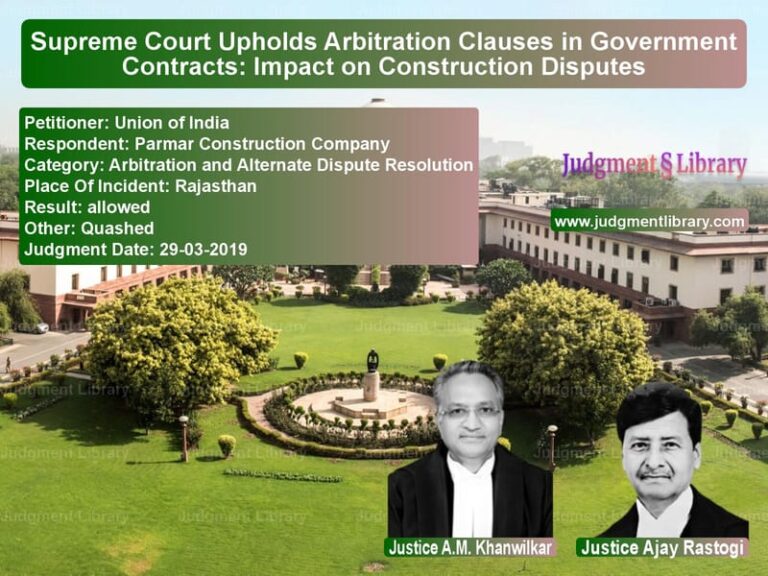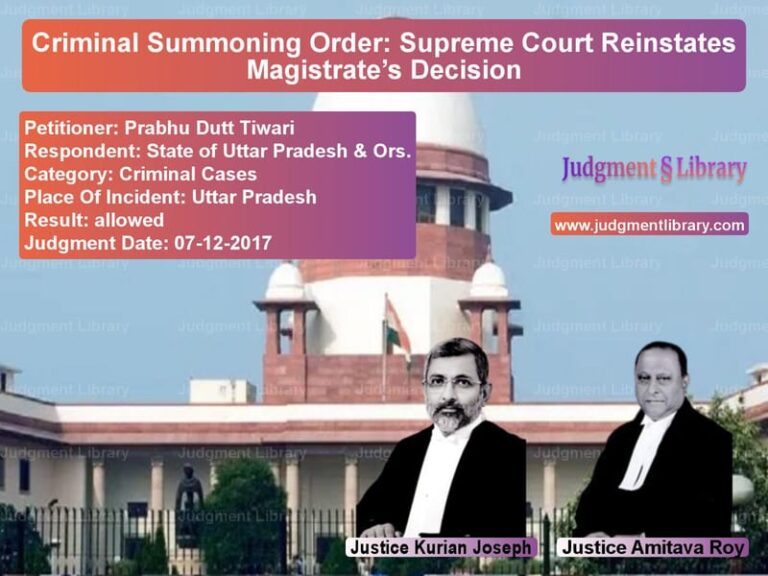Supreme Court Revives Appeal in Abkari Act Case After Death of Accused
The case of Ramesan (Dead) Through Legal Heir Girija A. vs. The State of Kerala pertains to a conviction under the Kerala Abkari Act, dealing with the sale and possession of illicit liquor. The Supreme Court was tasked with determining whether an appeal against both imprisonment and fine should abate upon the death of the accused.
Background of the Case
The case originated when Ramesan was charged under Sections 55(a) and 55(g) of the Kerala Abkari Act, which deal with offenses related to the illegal sale and storage of liquor. The prosecution presented oral and documentary evidence to establish the charges, while Ramesan denied all allegations in his statement under Section 313 of the Cr.P.C.
The Additional Sessions Judge convicted Ramesan on December 20, 2006, sentencing him to:
- Two years of imprisonment under Section 55(a) of the Abkari Act.
- A fine of Rs. 1 lakh, with six months’ simple imprisonment in case of default.
- An identical sentence under Section 55(g) of the Abkari Act.
High Court Proceedings
Ramesan appealed his conviction before the Kerala High Court on February 6, 2007. However, he passed away on December 21, 2007, during the pendency of the appeal. Despite his death, the High Court proceeded to hear the case and upheld his conviction, reasoning that:
“The sentence of imprisonment has become unworkable due to the accused’s death. However, the fine remains enforceable and shall be recovered from his estate.”
Arguments by the Appellant
Ramesan’s legal heir, Girija A., challenged the High Court’s decision before the Supreme Court, contending:
- The entire appeal should have abated due to the accused’s death.
- Since the sentence included both imprisonment and fine, the appeal should not have been partially decided.
- The High Court erred in proceeding with the case despite the death of the accused.
Arguments by the State
The State opposed the appeal, arguing:
- The fine was an independent part of the sentence and could still be recovered.
- Under Section 394(2) of the Cr.P.C., appeals against a sentence of fine do not abate upon the accused’s death.
- The appeal was rightly decided on its merits.
Supreme Court’s Observations
1. Legal Framework on Abatement of Appeals
The Court examined Section 394 of the Cr.P.C., which states:
“Every appeal under Section 377 or 378 shall finally abate on the death of the accused. Every other appeal under this Chapter (except an appeal from a sentence of fine) shall finally abate on the death of the appellant.”
The Court also cited Section 70 of the IPC, which allows a fine to be recovered from the deceased’s estate.
2. Appeals Against Sentences of Fine Do Not Abate
The Supreme Court relied on past precedents to hold that an appeal involving both imprisonment and fine should not abate entirely. It referred to Pranab Kumar Mitra vs. State of West Bengal (1959), which clarified that if a sentence includes a fine, the appeal remains valid even after the appellant’s death.
3. Need to Hear the Legal Heirs
While upholding the principle that an appeal against a fine does not abate, the Court found that the High Court erred by not allowing the legal heirs to participate in the proceedings.
“The High Court ought to have given an opportunity to the legal heirs to contest the fine before proceeding with the appeal.”
Final Judgment
The Supreme Court ruled:
- The High Court’s judgment was set aside.
- The appeal was revived and remanded to the Kerala High Court.
- The High Court must give Ramesan’s legal heirs an opportunity to argue against the sentence of fine.
Implications of the Judgment
This ruling clarifies several key principles:
- An appeal against a sentence of fine does not abate upon the death of the accused.
- Courts must allow legal heirs to contest the recovery of fines.
- Sentences of imprisonment become unworkable after an accused’s death, but financial penalties can still be enforced.
Conclusion
The Supreme Court’s ruling in this case establishes an important precedent in criminal appeals, ensuring that financial liabilities of deceased convicts are adjudicated fairly while safeguarding the rights of their legal heirs.
Petitioner Name: Ramesan (Dead) Through LR. Girija A..Respondent Name: The State of Kerala.Judgment By: Justice Ashok Bhushan, Justice M.R. Shah.Place Of Incident: Kerala.Judgment Date: 21-01-2020.
Don’t miss out on the full details! Download the complete judgment in PDF format below and gain valuable insights instantly!
Download Judgment: Ramesan (Dead) Throu vs The State of Kerala Supreme Court of India Judgment Dated 21-01-2020.pdf
Direct Downlaod Judgment: Direct downlaod this Judgment
See all petitions in Bail and Anticipatory Bail
See all petitions in Judgment by Ashok Bhushan
See all petitions in Judgment by Mukeshkumar Rasikbhai Shah
See all petitions in partially allowed
See all petitions in Remanded
See all petitions in supreme court of India judgments January 2020
See all petitions in 2020 judgments
See all posts in Criminal Cases Category
See all allowed petitions in Criminal Cases Category
See all Dismissed petitions in Criminal Cases Category
See all partially allowed petitions in Criminal Cases Category







